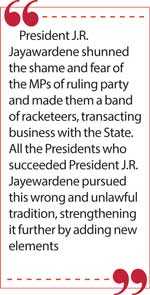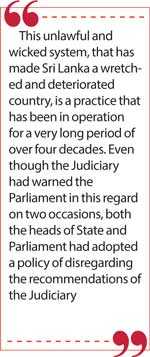Monday Dec 29, 2025
Monday Dec 29, 2025
Friday, 26 July 2019 00:10 - - {{hitsCtrl.values.hits}}

Despite being a small island, the quantum and the value of property belonging to the State of Sri Lanka is immense. All State lands, the ocean surrounding the island, tanks and reservoirs, streams and rivers, abundance of natural beauty, ecological and environmental system, space, water and air, natural resources and all economic means that exist in it belong to the Sri Lankan State. 
All this property of the State is acknowledged as common public assets belonging to the people of Sri Lanka. In a democratic country, the temporary custodianship of public property is entrusted to the government elected by the people to rule the country. In other words, the temporary responsibility of managing public property is assigned to the people’s representatives elected to the Executive and the Legislature that steer the helm of State rule.
The efficient management of this property for the benefit not only of the present generation of citizens, but also that of posterity, generating maximum income from them and developing the country for general welfare of the people can be considered as the legal and ethical obligation of the custodians of public property.
Yet, regrettably, Sri Lanka is in an uncivilised stage as far as the subject of public property is concerned. The conduct of temporary custodians of public property in Sri Lanka can be compared to that of the legendary fox that was given to look after a poultry pen. It can be said that the custodians of public property have been following a policy of plundering the said property at maximum level while they are in their custody. This practice has been going on with implicit consensus and for a very long period of over four decades. It can be said that this situation has resulted in Sri Lanka becoming an unproductive and economically bankrupt country.
The origin of the plunder
The large-scale looting of public property by its custodians themselves commenced and subsequently developed into an enormous plundering following the establishment of the presidential system of governance by J.R.  Jayewardene. It began and thrived during the regime of President J.R. Jayewardene. Using presidential immunity as a shield he persuaded his MPs to acquire public property through unlawful means. He even went to the extent of setting examples to assuage them if they had any fear, suspicion, reluctance or shame to do so.
Jayewardene. It began and thrived during the regime of President J.R. Jayewardene. Using presidential immunity as a shield he persuaded his MPs to acquire public property through unlawful means. He even went to the extent of setting examples to assuage them if they had any fear, suspicion, reluctance or shame to do so.
For example, as I have repeatedly quoted, President Jayewardene exchanged an unproductive coconut land at Madampe which was owned by him and his family for a section of a fertile coconut land situated at Naththandiya electorate called ‘Keenakale Watta’ belonging to the Land Reforms Commission. President Jayewardene had heavy arrears of tax payable to the Department of Inland Revenue. When the Commissioner General of Inland Revenue reminded JR of the income tax arrears, in writing, he in turn informed the Department of Inland Revenue that he would not settle the arrears and the tax payable for ensuing years as well and instead he would make arrangements to write a deed transferring the legal ownership of the land and the house at Ward Place, in which he and his wife were living, to the State, following their death, in lieu of the tax payable.
Pursuant to this undertaking, Elena Jayewardene, his wife, signed a deed of gift bearing number 6356, dated 10 March 1981 through John Wilson Notaries Company, Colombo. In this deed of gift she had unequivocally and specifically stated that the ownership of the house and the land on which it stands would be transferred to the Government of Sri Lanka, retaining life interest for her and her husband subject to conditions that the transfer would be effective only after the death of both of them; and the Government of Sri Lanka should vest the ownership of the house and the land with the Department of Archaeology and convert it into a museum of her and her husband and maintain it at the cost of the Department of Archaeology.
Twelve years after this strange deed of gift had been written, a new deed bearing number 7346 was written on 21 June 1993 cancelling the previous one and inserting new conditions. This new deed was also written by the same John Wilson Notaries Company. According to the revised deed, the house and the land should be transferred to the J.R. Jayawardene Centre following the death of her and her husband.
J.R. Jayawardene Centre
The J.R. Jayawardene Centre was also established by J.R. Jayawardene in a similar manner by an act of Parliament – Act No. 27 of 1989.
The house named ‘Vaijayantha,’ located in front of Victoria Park and the Municipal Council, Colombo had been built by the father of J.R. Jayawardene, around the 1930s. It was considered the ‘Mahagedara’ of the Jayewardene family. During World War II, the house was requisitioned by the Royal Air Force. However, after the war, the house and the land were returned to the Jayewardene family with compensation. The house was repaired with the compensation money received.
Later, in 1958, in view of financial hardships encountered, the land and the house were sold to the Chinese Government by the Jayewardene family to house the Sri Lanka Embassy of China in Colombo. Following J.R. Jayawardene coming to power, he managed to get the property back from the Chinese Government, offering a valuable piece of land located in front of the BMICH to the Chinese Government to construct a better building for the Chinese Embassy.
In all three transactions outlined above, it is evident that President J.R. Jayawardene had acted as the owner of the public property of the country and not as its custodian. Apparently, Presidents Ranasinghe Premadasa and Mahinda Rajapaksa may have followed the precedent created by J.R. Jayawardene in this respect, in converting the houses in which their parents lived into museums at public cost. President Chandrika too, at the end of her second term, acquired a valuable block of land, developed at the cost of the Government, near Diyawanna Oya, Sri Jayewardenepura Kotte, with Cabinet approval. However, she was compelled to give this land back to the State consequent to a case I filed at the Appeal Court against this transaction.
Racketeering with the State
President J.R. Jayawardene shunned the shame and fear of the MPs of ruling party and made them a band of racketeers, transacting business with the State. They were allowed to purchase State lands and valuable properties standing on them like estate bungalows at a nominal price. The MPs who were comparatively less cunning acquired valuable State lands subject to the ceiling of 50 acres while those who were shrewd acquired them in hundreds of acres by floating mushroom companies intended only for this purpose and thereby becoming planters and landed proprietors. Besides that, the President allowed them to transact business with the State as contractors and licence holders.
All the Presidents who succeeded President J.R. Jayewardene pursued this wrong and unlawful tradition,  strengthening it further by adding new elements. It was during the regime of President Premadasa that the system of private radio and TV institutions was allowed. The radio frequencies required for radio and TV broadcasting are considered extremely limited and an expensive resource that is essentially a public property. Since the Premadasa regime and up to date, the licences for radio frequencies have been issued without following a competitive and transparent procedure; instead they have been issued through underhand deals conducted covertly.
strengthening it further by adding new elements. It was during the regime of President Premadasa that the system of private radio and TV institutions was allowed. The radio frequencies required for radio and TV broadcasting are considered extremely limited and an expensive resource that is essentially a public property. Since the Premadasa regime and up to date, the licences for radio frequencies have been issued without following a competitive and transparent procedure; instead they have been issued through underhand deals conducted covertly.
When the presidents themselves grant licences to their kith and kin or to their cronies at a nominal price, it invariably creates a tradition in which the licenses are sold to third parties while the original owners who purchased them at a nominal price becoming millionaires and billionaires. The revenue loss to the Treasury by this practice could amount to several billions of rupees. During the regime of Chandrika, a system of issuing liquor permits through MPs was in operation. By that, a considerable number of MPs, directly or indirectly, became liquor shop owners
Ignoring the Judiciary
By now, a large number of MPs have become racketeers transacting business with the State, contrary to the law. Having purchased State lands, some of them had become landed proprietors and planters. Some others had become government contractors. Some had become owners of liquor shops and distilleries while several others had become businessmen engaged in re-export activities. It is also this set of racketeers which has acquired the monopoly of the sectors that deal with rubble, sand, soil and timber businesses as well.
This can be considered an extremely wicked and ugly situation that shouldn’t exist in a country and a state. It has resulted in distorting completely the nature and orientation of people’s representatives, the Parliament, the system of governance, system of administration and rulers of the State. Besides that, it has confused and weakened the rule of law. In addition, this situation has resulted in diminishing State revenue, thereby pushing the country into a state of bankruptcy, so much so that it has to depend on colossal foreign loans for survival, and created a situation in which the valuable resources of the country are being sold to foreign countries, making the poor poorer and increasing the indebtedness of the nation and the people. This unlawful and wicked system, that has made Sri Lanka a wretched and deteriorated country, is a practice that has been in operation for a very long period of over four decades. Even though the Judiciary had warned the Parliament in this regard on two occasions, both the heads of State and Parliament had adopted a policy of disregarding the recommendations of the Judiciary.
The first warning by the Judiciary was issued in the judgment declared by a panel of judges headed by Chief Justice Neville Samarakoon, depriving Albert Silva, MP for Galle, of his parliamentary seat, consequent to the hearing of the case filed by W. Dahanayaka against the former for possessing a licence issued by the Government for distribution of kerosene by the time he was elected to Parliament.
In this judgment, the panel of judges had expressed their deep concern over the wholesale abolition and callous disregard of a strong tradition that had been in operation to ensure the integrity and transparency of the conduct of parliamentarians. Even before the ink on the judgment passed by the Judiciary ran dry, President J.R. Jayewardene appointed Albert Silva to the Kamburupitiya seat on the chit system.
After 21 years, the panel of judges that heard the case against MP Rajitha Senaratne while depriving him of his parliamentary seat had reminded of the previous warning issued during the case against Albert Silva. Even in this case, the Leader of the UNP reappointed Rajitha Senaratne to Parliament on the National List. These two examples illustrate that the heads of State, political leaders and Parliament are not prepared to change this corrupt system, which is contrary to the law.
What can be done to change the system?
It is a serious offence contrary to the law for candidates contesting elections or representatives of people elected to the Legislature or the Executive to engage in business with the State directly or indirectly or through other dubious means. So far, no one has realised the seriousness of this offence and attempted to rectify it.
When the 19th Amendment was being prepared, I stated that the structures of the presidential and parliamentary system of governance operative in Sri Lanka are corrupt; hence, mere abolition of presidential system of governance and transferring powers of president to Parliament without changing the corrupt structures of the parliamentary system would not be a good solution.
The founders of the 19th Amendment viewed me as a troublemaker obstructing their initiative and tended to ignore my views and criticisms. When the JVP put forward the 20th Amendment, I criticised that too, on the same principle. Even the public litigation lawyers have failed to realise the gravity of this situation that can be compared to a chronic cancer that has overwhelmed the entire system.
In the end, we, the Renaissance Movement, decided to design a strategic plan to arrest this cancer. Accordingly, we made the Speaker of Parliament and the Election Commission aware of this situation in writing. The Speaker of Parliament, while not rejecting the allegation that the parliamentarians are engaged in business transactions with the State, informed us in writing that constitutionally he has no authority to take action in this regard. It cannot be considered a meaningful response.
It is the legal and moral responsibility of the head of any institution to investigate into and take appropriate action if there is serious corruption in the institution. It is a compulsory obligation on the part of the head of the institution. A policy that prompts aloofness in the presence of a likely occurrence of a serious offence cannot be a good policy.
In addition to the Speaker of the Parliament, we made a similar presentation, in writing, to the Election Commission as well. We requested the Election Commission to make it mandatory for the candidates to submit an affidavit confirming that they are not engaged in business transactions with the State before accepting nomination papers for elections because it is contrary to the law for those transacting business with the State to submit nominations and contest elections.
In response to our letter, the Election Commission convened a meeting on 13 July 2019 to discuss the issues that we raised. A team of Renaissance Movement members attended the meeting. It became evident that the Election Commission had carefully studied the legal basis of our request. The Election Commission admitted our stance that no one shall be allowed to contest elections contrary to the law. The commission was of the view that it is a practical solution to obtain affidavits from all contestants when accepting nomination papers. It also admitted that the submission of declaration of assets and liabilities too shall be made compulsory. In this case, the Election Commission deserves the commendation of the entire voter population for admitting the fact that there is no right for people transacting business with the State to contest elections and also for agreeing to adopt a policy that will make it compulsory for those contesting to submit an affidavit when handing over the nomination papers. It would be possible that the prospective candidates may attempt to circumvent this hurdle by submitting false declarations; yet, the repercussions of it will be serious as an affidavit is a legally-binding declaration and the candidates submitting false affidavits, if proved guilty, are likely to face the risk of being punished and imprisoned. We do not intend to stop this issue at this point. We hope to take it to the Supreme Court. This is an important issue which has a critical and significant bearing on the survival of the country. Yet, we cannot expect the Parliament to abandon this corrupt system willingly, as it is a system sustained by the Parliament itself. Therefore, in the final analysis, we are compelled to submit this matter for the prudence and jurisdiction of the Supreme Court which we hold in high esteem and good faith.
We earnestly hope that the Supreme Court and the Chief Justice, having considered the national importance of this issue, would provide necessary guidance and orders to eradicate this corrupt system. The Supreme Court, we believe, has the power to do that.